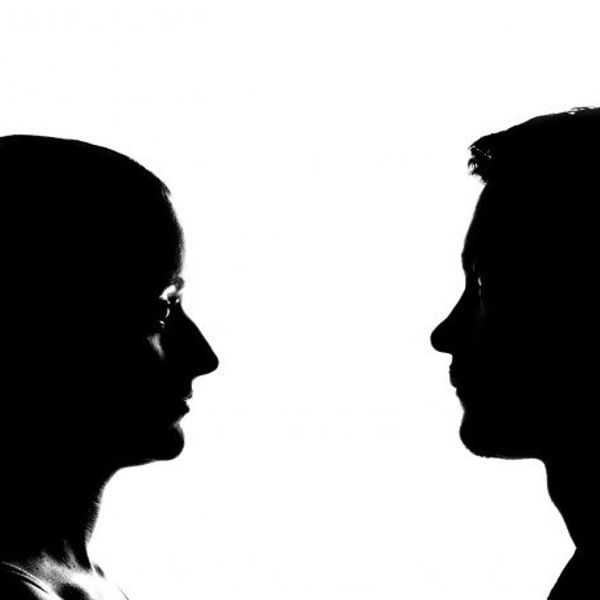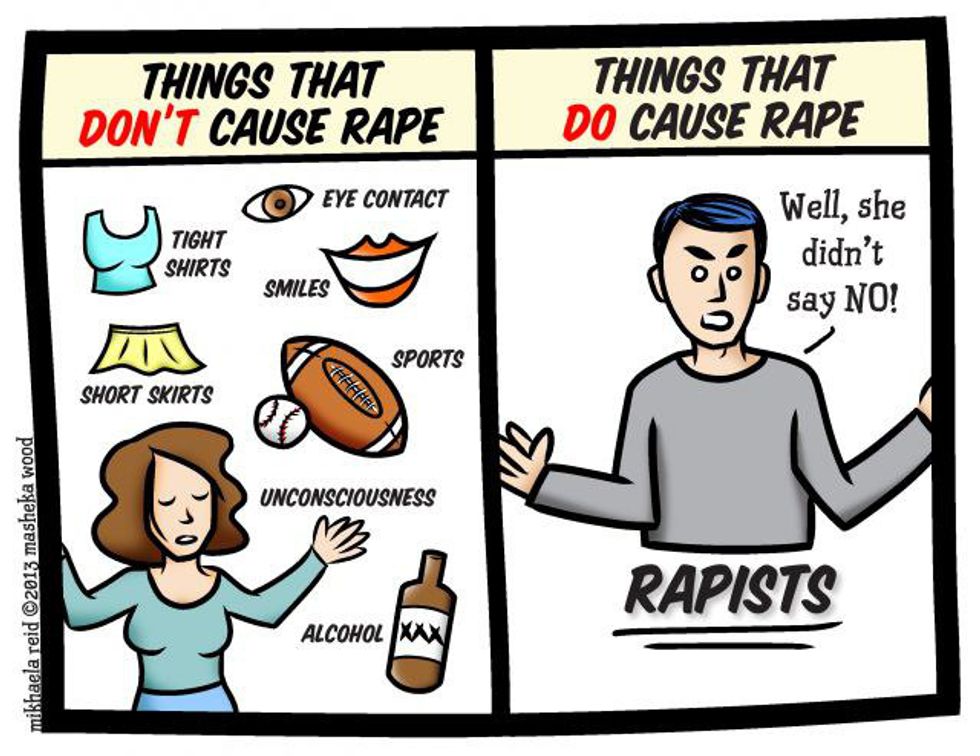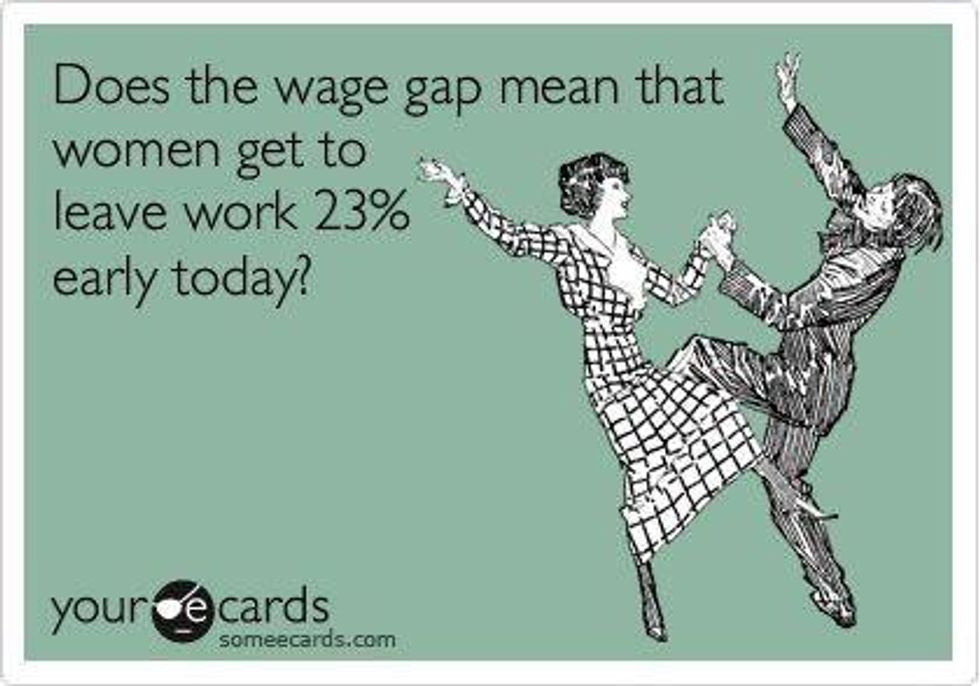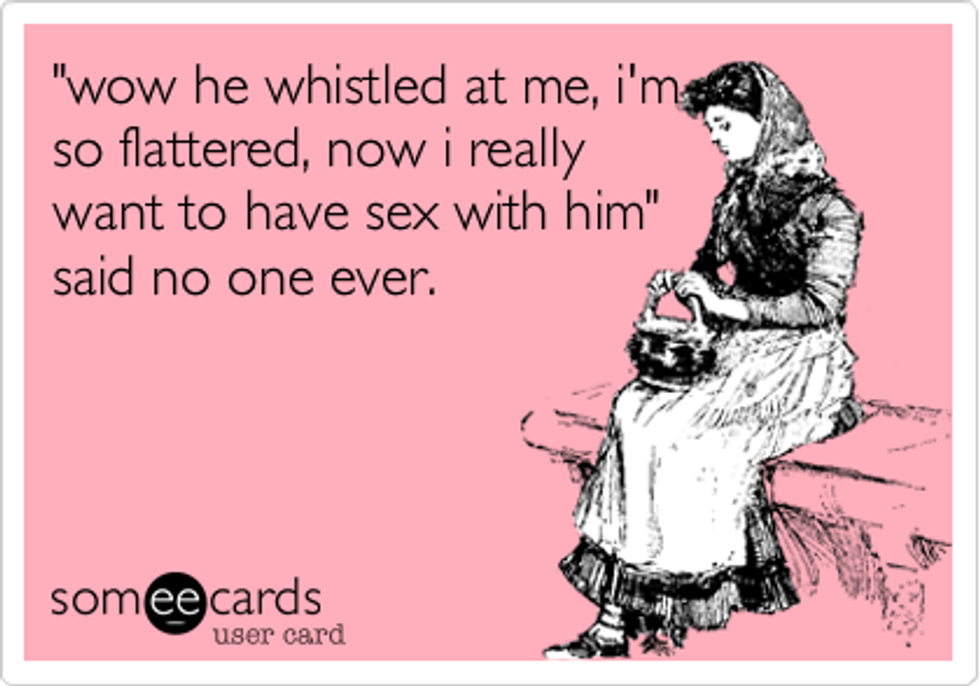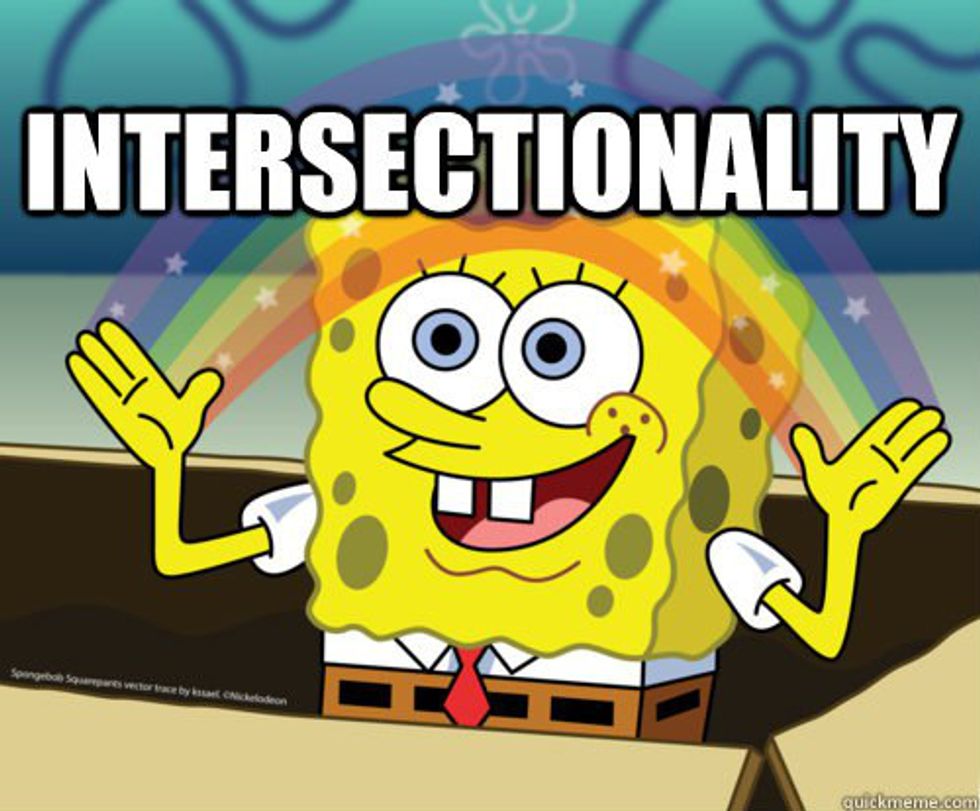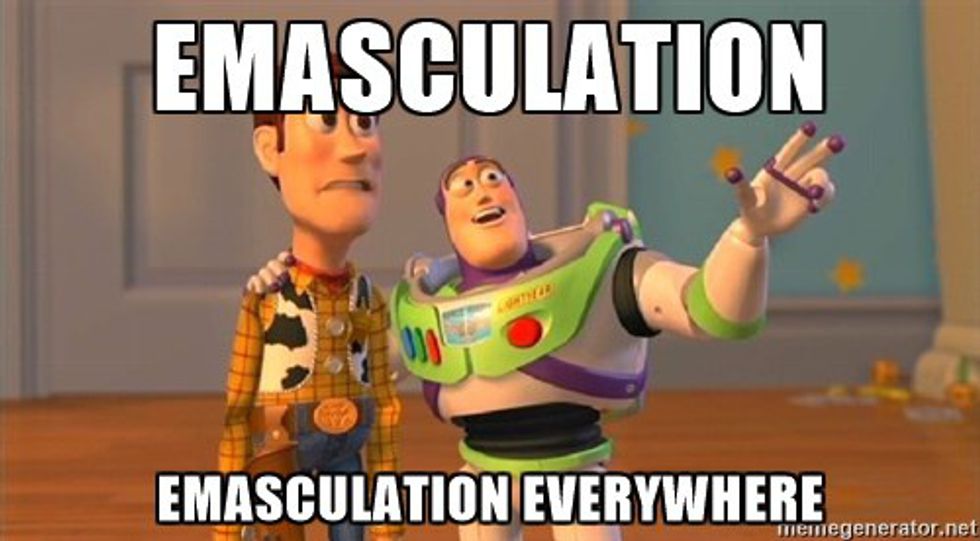Thanks to feminism (the advocacy of social, political, and economic equality for men and women), U.S. society is not the same as it was 100—or even 50—years ago. Women can vote. Women can take out loans in their own names. Women no longer have to have written permission from their parents or husbands to obtain birth control. Unlike days of old, it’s not so shocking when a woman decides to go to work instead of being a full-time homemaker. Unfortunately, although some may claim that gender equality finally exists, we still have a long way to go. If you’re not sure what I’m talking about, take a look at these reasons why we still need feminism.
1. Rape culture is alive and well.
If you’re not familiar with the term “rape culture,” it refers to how society blames the victims of sexual assault (instead of their attackers) and normalizes male violence. It should make you feel uneasy to know that--according to the Rape, Abuse, & Incest National Network (RAINN)--one in six American women has experienced rape or attempted rape at some point during her life. For college women alone, the number jumps to nearly one in four (about 23 percent) experiencing rape or attempted rape. That’s a big number. However, we have to wonder how accurate that number is due to rape being largely under reported. It would not be surprising if the number was even higher because, according to the U.S. Department of Justice, 80 percent of rape and sexual assaults on college students go unreported to the police. Maybe this could be due to the embarrassingly pathetic punishments rapists are given. Think of Brock Turner, for example. He served a whopping three months (only half of his big-boy six-month sentence) for his brutal assault of an unconscious woman behind a dumpster, and even he was an exception to the rule, as 97 percent of the rapists that are even reported don’t spend a single day in jail, according to RAINN. Not a single day. It’s as if the judicial system—and even society at large—just accepts sexual assault as a fact of life. We spend more time telling women how to avoid getting raped (don’t walk alone at night, don’t wear skimpy clothing, don’t drink alcohol—in other words, don’t do anything that could be misconstrued as you “asking for it”) than we spend on telling men not to rape. This is rape culture, and it’s not right. Personally, it makes me sad for society and afraid to be a woman.
2. There is gender inequality in the workplace.
If you think women have finally won equality (as if that’s anything we should have even had to fight for in the first place), think again. According to the American Association of University Women (AAUW), as of 2016, women make 80 cents on the dollar that men make. This is partially accounted for by women typically being discouraged from entering "male-dominated" (and therefore higher-paying) fields such as mathematics and engineering. However, even in the same field of work, one year after college graduation, the AAUW says a woman will make as little as 77 percent of what her male counterpart makes. In the same profession. (Yes, computer science, I'm talking about you.) Besides the wage gap, there is another major problem that women face in the workplace: sexual harassment. A Cosmopolitan survey of 2,235 full-time and part-time female employees found that one in three American women reports having experienced sexual harassment at work. This could include having been subjected to unwanted sexual advances, requests for sexual favors, and other comments or gestures that are sexual in nature. How nice that even when women become successful professionals, they still have to deal with the misogyny that reminds them they're not welcome there in the first place.
3. Women are barely safe in public spaces.
One of my college professors has made the observation that public space is men's space. This is very true. Depending on the location and time of day, a carefree outing for a man could end up being a nightmare for a woman. At the very least, women have to constantly be on guard--making sure they have their keys in their hands well before they get to their car doors, making sure that no suspicious males are following them, making sure that if something were to happen to them, they would have a way out. If you're not attuned to it, it might surprise you that --according to Stop Street Harassment--87 percent of American women (ages 18-64) have been harassed by a male stranger. More than that, 41 percent of American women have experienced aggressive forms of harassment in public, such as flashing, following, and groping. Think about that. 41 percent of women have been violated in the most basic way possible by complete strangers. This isn't even just a problem in urban settings. Women from rural and suburban areas have reported just as much sexual harassment on the streets as those who live in big cities. It is a harsh reality that every woman eventually comes to accept. Don't believe me? Ask your mom. Ask your sister. Ask your girlfriend. Ask any woman. Street harassment can be scary and threatening, and it is incredibly common. It shouldn't be this way, though. I dream of a day when women will be able to feel safe as they walk down the street--be it day or night. I dream of a day when we won't have to worry about being groped on a crowded bus or being verbally violated by groups of strange men.
4. Women are vastly underrepresented in government.
Considering that half of Americans are female, you would think that half of our legislative body should also be female. You would think. In reality, women hold just under 20 percent of the seats in congress according to the Congressional Research Service. That puts us at 97th place in the world for gender equity in government on the Inter-Parliamentary Union's list of women in national parliaments. Some of the countries that come above us on that list are Iraq, Afghanistan, Sudan, and Ethiopia. Think about that. Although gender inequality in the government is ridiculous based on the sheer fact that women make up half the population, it presents another problem: The men who run the government get to make laws that police women's bodies. And really, they love to do this. According to the Guttmacher Institute, Between 2010 and 2014 alone, they passed 231 laws that in some way restricted the reproductive rights of women. How many laws were passed that policed the male body? A big, fat, whopping, zero. There is absolutely nothing fair about this. A woman's body is not an "issue" that needs to be addressed by the government. It is literally a human body.
5. Double jeopardy makes discrimination even worse.
Being a woman is not easy. It comes with quite a bit of discrimination. However, being a woman of color is even harder because for whatever reason, our country is having a hard time getting over its racist past. When racism and sexism intersect, it is known as double jeopardy--two forms of discrimination coming together. Take, for example, the wage gap. Women make 80 cents on the dollar that men make--that is, white women. Women of color have it even worse. Black women earn 65 cents on the dollar that white men make, while Hispanic women earn only 58 cents, according to the Pew Research Center. And this is if they get a job despite the likelihood that a possible employer may not hire them due to racial bias. As far as street harassment goes, women of color are more likely to experience both verbal and physically aggressive harassment, and they reported experiencing it more frequently than white women in a 2014 Stop Street Harassment survey. It is unfair to look at sexism without also looking at racism. These two modes of inequity intersect to create unique experiences of discrimination for each individual.
6. There is a clear double standard with sex.
As Jessica Valenti would put it, "He's a stud, she's a slut." It's a terrible double standard. While men are generally praised for engaging in sexual activity and graduating into manhood, women are more often encouraged to hold on to their purity for as long as they can before they are "deflowered." When a man has a lot of sexual partners, he is thought of as a stud. A woman with multiple partners, a slut. Ironically, it does take two people to have sex--many times, a man and a woman. If sex between unmarried people results in a pregnancy, it is commonly the woman who has to carry the emotional burden as people whisper, "She got herself knocked up," while the man gets to run free. The kicker to this is that women receive such contradictory messages when it comes to sex. On one hand, the media is saying, "be sensual, be sexy, be attractive to men," and on the other, society is saying, "Don't have sex unless you want to be branded a whore." This is a pretty archaic notion, but somehow, even in the 21st century, it keeps surfacing.
7. Men are suffering, too.
Male privilege definitely exists--that cannot be denied. However, there are ways that men do suffer on account of gender inequality. From a young age, there is often a pressure on males to be masculine. The definition of masculine: not feminine. This becomes a problem when a man wants to express emotion or sensitivity, which is something associated with femininity. Even as children, little boys are often told not to "cry like a girl." When they get older, if they aren't acting masculine, they will hear misogynistic comments like "don't be a pussy," "don't be a bitch," or "grow a pair." The expectations we put on men to be masculine are very damaging. So damaging, in fact, that--according to the Center for Disease Control (CDC)--male suicide rates are four times higher than female rates. Suicide is actually the seventh leading cause of death in men. Could this be due to the expectations society puts on males to act masculine and bury their emotions? Or maybe because we also put pressure on men to be strong protectors and providers? It would not be surprising. This is a manner in which men are negatively affected by sexism--not because society devalues these men, but because society devalues anything associated with femininity. We need feminism for men and women alike.


